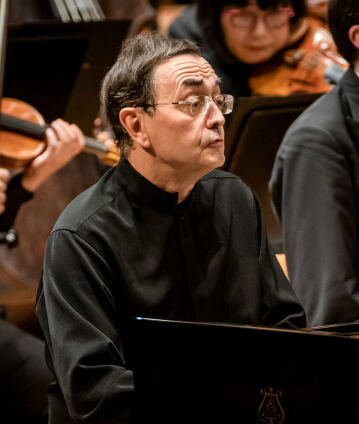François-Xavier Roth and Pierre-Laurent Aimard

Pierre-Laurent Aimard is one of the foremost musicians of our time – a “thinker at the piano” (The Washington Post). Together with François-Xavier Roth, general music director of the city of Cologne, he performs Béla Bartók’s Third Piano Concerto, a work permeated by a soft parlando tone and gentle melancholy. The other works on the programme are wonderfully energetic – albeit in very different ways: Joseph Haydn’s Fire Symphony, and Arcana by Edgard Varèse.
The motto for this concert programme could be “transformations”. Each work on the programme illuminates the concept in its very own way: Edgard Varèse was inspired to compose his orchestral work Arcana by the teachings of Paracelsus, a great doctor, alchemist and mystic of the 16th century who sought a universal remedy with the ability to heal, transform and renew people. Throughout his life, Varèse was considered a provocateur, one who aimed to transfer the music that had been passed down into a new soundscape. His pieces are noise-like, harsh, aggressive, erratic, and they uniquely reflect the modern lifestyle in the first half of the 20th century. The composer, originally from France, emigrated to the USA in 1915; with Amériques and Arcana he then composed the two monumental orchestral works with which he proved himself one of the most innovative minds of his time.
Béla Bartók’s Third Piano Concerto was also composed in the US, but under completely different circumstances: after his emigration, the Hungarian did not succeed in making a livelihood in America. Public interest in his works remained limited, and only commissions from leading artists, above all Sergei Koussevitzky, provided some income. When the composer conceptualised his Third Piano Concerto for his wife, the pianist Ditta Pásztory, he was critically ill and already at the brink of death. He struck a note in the concerto that audiences had not experienced in his two other piano concertos: ruminative, romantic, full of devotion. Bartók reverts to Baroque compositional techniques like the fugue and counterpoint, combining them with the characteristically Hungarian idiom typical of his music. In the words of Pierre-Laurent Aimard, the programme’s soloist, the challenge of the concerto lies in shaping the phrasing so that “it sounds Baroque but also Bartók-like.”
The programme will kick off with Joseph Haydn’s so-called Fire Symphony. The nickname, which was given to the work only later, stems from the assumption that Haydn composed the work as an interlude for a play called the Feuersbrunst (conflagration). With its impulsive, dramatic gesture, the symphony is captivating. Haydn works with short, succinct, opposing motives which he sometimes derives from each other, varies individually, and which give the piece a sweeping rhythmic magnetic “pull effect”. François-Xavier Roth will conduct the Berliner Philharmoniker. When he shapes programmes as conductor, he enjoys looking for the balance between old and new music, and he’s also a recognised specialist in Edgard Varèse’s oeuvre.
© 2019 Berlin Phil Media GmbH
Related interview
Artists
Our recommendations
- Schoenberg’s Piano Concerto with Pierre-Laurent Aimard and Jiří Bělohlávek
- An “American Evening” with Ingo Metzmacher and Pierre-Laurent Aimard
- Pierre Boulez and Pierre-Laurent Aimard with works by Ravel, Bartók and Boulez
- Jonathan Nott and Pierre-Laurent Aimard
- Simon Rattle conducts Messiaen’s “Turangalîla-Symphonie”
- François-Xavier Roth conducts “Le Sacre du printemps”